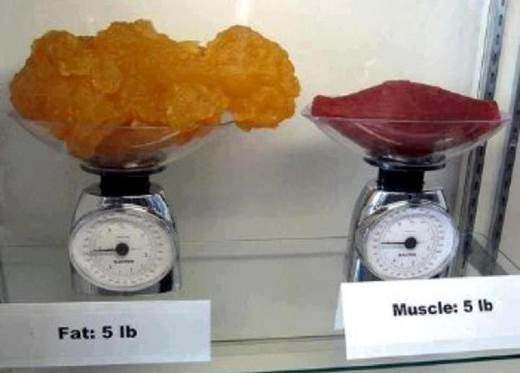Or does it? What weights more? A pound of muscle of fat? Here’s what Len Kravitz, Ph.D., and one of the leading exercise physiologists in the country has to say:
A pound of fat and a pound of muscle definitely weigh the same amount. But when it comes to body composition and how these components affect how you look, there is a world of difference.
Essentially, it’s truly all about body composition – the amount of fat versus the amount of muscle in your body. From the standpoint of mass, a pound of feathers is the same as a pound of lead bolts, but the feathers will fill up a larger volume of space than the lead bolts.
Similarly, a pound of fat will take up 20 percent more space than a pound of muscle. To truly understand the difference, you need to look at more than just a simple comparison between a pound of muscle and a pound of fat.
You need to factor in another variable: density. Muscle has a density of 1.1 g/cc compared to fat, which has a density of 0.9007 g/cc.
In practical terms or, better yet, how this affects your appearance, when you compare equal weights of fat and muscle, fat takes up 20 percent more volume, or bodily space, than muscle, making you look 20 percent fuller (or fatter)!
From an exercise perspective, this is a solid scientific justification for choosing the best way to change your body appearance: a combination of resistance training (which increases your muscle) and aerobic exercise (which decreases your fat).
One important aspect to consider is this: Individuals who choose to only diet often lose 25 percent or more of muscle with their weight loss – as a result, they often don’t appear to have lost as much weight as they claim.
But if your diet is combined with exercise (aerobics and resistance training), the loss of muscle is often less than four per cent, which makes a world of difference visually.
Clearly, the issue of what weighs more – muscle versus fat – is more complex than it first appears. To answer it fully, you have to factor density into the equation.
And once you do (so that you may weigh more but look leaner), it isn’t enough to rely on a body mass index (BMI) measurement or your bathroom scales as the only indication of where you’re at in terms of ideal weight.
Again, it all comes down to body composition: the amount of fat versus the amount of muscle in your body.
Fast Fact: About 40 percent of your body weight is muscle. [source]

